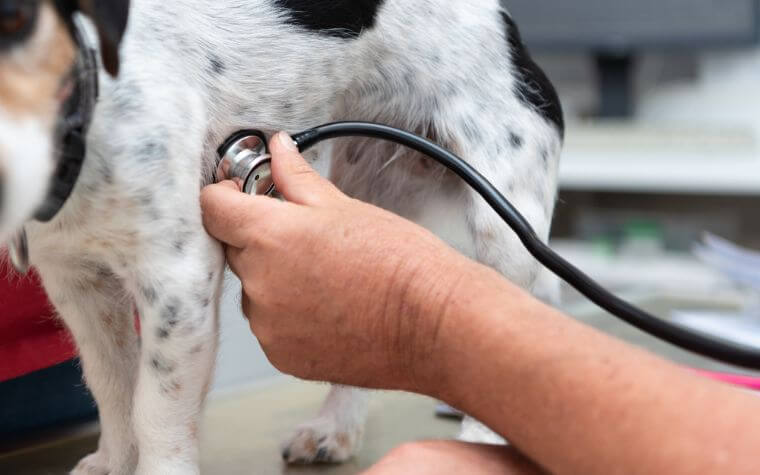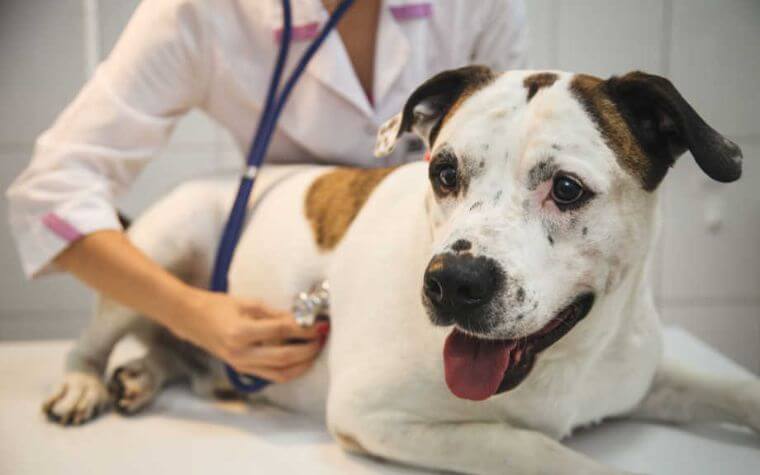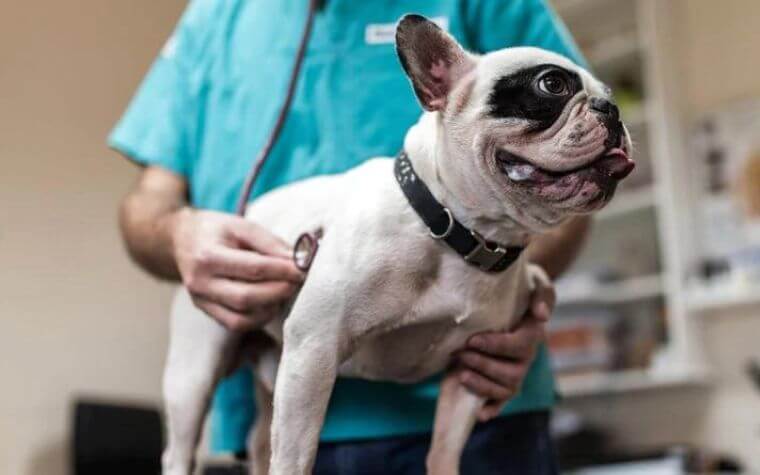When we think of dogs, all we think about are adorable, loyal fluffy friends. And just like that, we do imagine Dog’s Heart full of diamonds and overflowing with love.
Scientifically, the four-chambered heart with double circulation and warm blood, as it is said, makes mammals different from other vertebrates.
Your dog is not different, just like your heart. It beats, circulates blood, and changes its rhythm according to physical exertion.
Also Read:- Facial Swelling in Dogs Can Be an Early Sign of a Serious Health Issue
What Is the Average Heartbeat Rate in Dogs?

The heart rate in dogs is different from humans, the only similarity being that it increases with activities and decreases when relaxed. The pulse rate of the heartbeat rate of your dog’s heart depends upon its size. It’s 60 to 100 beats per minute in large dogs, while the smaller dogs have 100 to 140 beats per minute. In puppies, the heartbeat is much more rapid and can range from 160 to 200 beats per minute.
When in confusion, you can always consult and ask your veterinarian.
How Can You Check Your Dog’s Heart Rate?

A dog owner should learn these small things to keep a close eye on your dog’s well-being. Heartbeats play a significant role in telling your dog’s health.
Just like in humans, all you have to do is find the pulse and count the rhythmic beats per minute.
First of all, let your dog relax. Heartbeat rate can change with physical exertion, so it is important that your dog is in a resting position and is relaxed so you can get the normal rate. Now, place your hand on the inner mid-thigh of the rear leg. Near the surface, you should be able to feel the femoral artery throbbing. Note the time and count the number of beats in a full minute.
What Can a Dog’s Heartbeat Tell Us?

Irregular heartbeats are not uncommon in dogs, and while they may not indicate a significant health condition, they should be investigated by your veterinarian.
Problems often can’t be detected by owners and come out in routine checkups. If you feel your dog has an erratic heartbeat, you should take him to the doctor straight away since this might indicate a severe problem.
An aberrant electrical activity pattern in the heart muscle causes irregular heartbeat, often known as arrhythmia. Canine arrhythmia refers to any variation or disruption in a dog’s normal heart rate or rhythm.
Symptoms of Irregular Heartbeat
- Slow or very rapid heartbeat in comparison to normal
- Breathing problems
- Dizzy and weakness
- Lack of any activities
- Cough and fatigue.
Causes of Irregular Heartbeat
An irregular heartbeat can affect dogs of any age, sex, or breed, particular breeds are more prone to certain forms of arrhythmia.
- A congenital or underlying disease
- Due to their difficulties breathing, short-muzzled dogs such as Bulldogs, Pugs, and Pekingese are more typically afflicted.
- Dogs of the giant breeds, such as Saint Bernards, Great Danes, and Mastiffs, are more prone
Heart Diseases in Dogs
A dog’s heart might be a cause of concern from a medical viewpoint. Our canine companions, like their humans, are prone to heart disease.
What is heart disease in dogs?
Any issue that affects your dog’s heart or blood vessels and interferes with their regular activities is referred to as heart disease.
If your dog shows any of the signs or symptoms of heart disease, you should take them to their veterinarian for a more detailed diagnosis and treatment plan.
Canine heart disease can be congenital or acquired:
- Congenital cardiac disease is present from birth in dogs and can be passed down through the generations.
- Acquired cardiac disease: Due to wear and strain on the cardiac structures, acquired heart disease in dogs most commonly affects middle-aged to elderly dogs. However, it can also be caused by an accident or illness.
Also Read:- Fascinating and Amazing Facts About Dogs’ Tongue That Dog Lovers Must Know
What Causes Heart Diseases in Dogs?

Even though there is no one cause, dietary issues can play a significant role in heart disease. Heart disease in dogs is most commonly caused by aging, however other causes such as heartworm can also cause heart disease.
- Dog Obesity: Overweight dogs are at a higher risk of developing heart disease.
- Old Age: As dogs get older, they are more likely to have heart problems. Our organs degrade with time, which is a normal process. Similarly, when a dog gets older, its body experiences ‘wear and tear.’ Vital organs, such as the heart, become susceptible as people age. It loses its tenacity, and the process of delivering oxygenated blood to the body slows down. The heart eventually exhausts itself, resulting in cardiac failure.
- Dog breeds: In dogs, tiny breeds such as miniature poodles, cocker spaniels, Pomeranians, and schnauzers are more likely to develop chronic valvular disease. Large and enormous breeds, such as Great Danes and Irish wolfhounds, are more prone to myocardial disease.
- Lack of Physical Activity: A healthy lifestyle is essential for a dog. It requires a lot of physical activity to do this. For the dog’s emotional and physical well-being, frequent walks and fun are vital. A dog’s heart disease risk increases if it is prone to sitting inactive without the necessary exercise.
There Are Several Underlying Health Conditions That Can Cause Heart Disease

- Endocarditis: This ailment, which is usually encountered in senior dogs due to misuse of the vales, is deadly to the dog. In this instance, the valves may refuse to open or close since they have been operating for a long period.
- Stenosis of the lungs: The pulmonary artery is blocked, which causes this. The pulmonary artery is in charge of transporting blood to the lungs for oxygenation. When this artery is blocked, the heart has to work harder to pump blood to the lungs, which leads to overuse.
- Muscle Disease of the Heart: Dilated cardiomyopathy (DCM) in dogs is one of the most prevalent and dangerous cardiac muscle illnesses in dogs. It reduces the capacity of the heart to pump blood via the vascular system, causing the heart to enlarge.
- Atrial Septal Defect:
The ventricular septum separates the right and left sides of the heart. It is a crucial cardiac characteristic because it distinguishes between oxygenated and deoxygenated blood.
Some of the Most Prevalent Causes of Canine Heart Disease

- The valvular illness affects all dog breeds, although toy and tiny dog types are particularly susceptible. The mitral valve is the most usually impacted valve. However, other heart valves can also be affected.
- The muscular structure of the heart is affected by the myocardial disease, commonly known as cardiomyopathy. Cardiomyopathy affects all dog breeds; however, big dogs are usually affected.
- Cardiac arrhythmias are abnormal heartbeats or cardiac rhythms caused by canine heart disease, which disrupt the heart’s (electric) regulating mechanism and, as a result, the heart’s ability to beat usually.
- The pericardium, or sac that surrounds the heart, is affected by pericardial disease, which causes the heart to become restricted and unable to beat effectively.
Also Read:- What are the Reasons for Drooling in Cats?
What Are the Symptoms of Heart Disease?

There are various indicators of cardiac disease in dogs that dog owners should be aware of, including:
- Lethargy
- Weakness
- Intolerance to exercise
- Physical activity is difficult or impossible to do.
- Breathing difficulties or shortness of breath may be accompanied by fluid accumulation.
- Dormancy necessitates rapid breathing (not panting)
- Fainting/collapse
- Coughing for a long time
- A heart rate that is consistently increased
Also Read:- How to Improve Your Dog’s Digestion? The Digestion Process and Choosing the Best Food for Your Dog
Treatment & Prevention of Dog Heart Disease

The key to treating heart disease in dogs is early detection.
Dog owners must be diligent in detecting early signs of canine cardiac disease. After all, a dog can’t communicate how it feels to us in a language we can comprehend.
The soon you see signs, take them to the vet to properly examine the situation. Your veterinarian might run the following tests:
- Ultrasound
- Blood pressure
- Electrocardiogram (EKG)
- X-Rays
- Blood analysis
Dogs can live a very normal life despite the fact that there are no medicines that can reverse heart disease.
Your dog’s diet has a significant impact on his general health and well-being. It’s even more vital to provide the correct dog food if your dog has been diagnosed with cardiac disease.
The heart enlarges as a result of cardiac disease, and this growth results in a loss of efficiency. The heart then begins to store more fluid than it should when significant issues arise.
As a result, doctors advise feeding dogs a low-sodium diet to decrease fluid build-up and make it simpler for their hearts to function properly.
